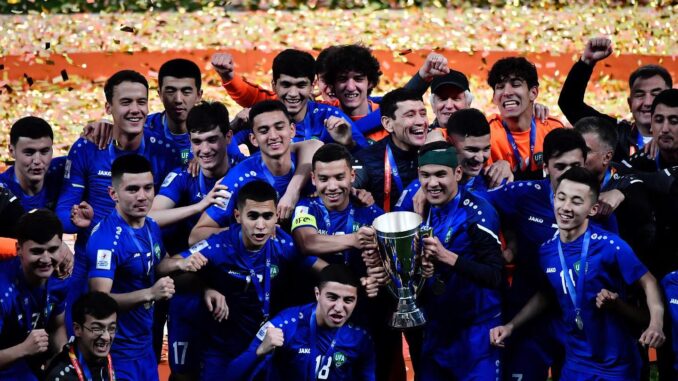
Less than six months since Asia delivered their most successful senior World Cup, the upcoming Under-20 World Cup represents another chance to determine the continent’s place amongst the very best on the global stage.
Hand-in-hand with evaluating the quality on the pitch, this year was supposed to demonstrate Asia’s increasing ability to host these types of events. Delayed two years due to COVID, Indonesia’s hosting of the crown jewel of FIFA youth tournaments had been billed as a directional shift for the country’s football, only to be yanked from beneath it’s feet at the very last hurdle.
The fallout that greeted Indonesia’s political opposition of Israel ahead of the U20 World Cup draw, frustratingly materialising just days before it was held, rather than over nine months previous following Israel’s safe passage through UEFA qualification, led to Indonesia’s removal as host by FIFA; a hammer blow to a nation still digesting the Kanjuruhan Stadium tragedy last October, which saw 131 football fans lose their lives.
It’s unsurprising then, that amidst Indonesia’s U22 success this week at the Southeast Asian Games, which further underlined the promise of a new generation of talent, we’re once again forced to focus on the ugly scenes that took place off it, as clashes between opposing coaches made international headlines.
While the catalyst for the U20 World Cup hosting removal was, on the face of it, an isolated factor, what can’t be separated is the growing difficulties the Indonesian FA currently face as they attempt to rebuild their reputation on a continental and global standing.
Indonesia’s withdrawal has seen Argentina step into the hosting void; set to accommodate a competition they failed to qualify for just three months ago.
While a last minute hosting change will undoubtedly have an impact on the tournament, it doesn’t dampen expectations of Asian success, buoyed by South Korea’s run to the final in Poland four years ago.
In recent U20 Asian Cup champions Uzbekistan, who clinched the title back in March, there is an established sense and growing expectation that Asia can mix it with the world’s very best young sides.
The development of Uzbek football has been remarkable in its effectiveness over the last decade, following on from back-to-back quarter-final runs at their first two U20 World Cups in 2013 and 2015, this generation has high hopes of replicating, or even exceeding their previous best at this competition.
There’s no doubt this generation is at a more mature stage of their development; more stable and increasingly astute in their pursuit of competing and succeeding at such a standard.
Even in their preparation – a two month run up to the tournament, with recent experience of bedding down in South America in advance – the improved organisation and professionalism put in place by the UFA ahead of the tournament is a stark change to what had previously been expected.
While the preparations have been impressive, the team itself, however, does potentially lack that bit of excitement previous cohorts once had.
Despite having conceded only one goal on their way to securing the U20 Asian Cup crown, Uzbekistan struggled at the other end of the pitch, scoring only five goals in six games, two of which came via the penalty spot and an own goal.
The undisputed stars of the team come in supporting areas, through the ingenious touches and link up play of Abbosbek Fayzullaev, a member of the U23 continental finalists set up, and the transitional impact of Umarali Rakhmonaliev. Yet a telling focal point was often the missing part of their attacking game.
The positive for Ravshan Khaydarov’s men is their stability; a strong core anchored by Abdukodir Khusanov in defence and the composed presence of Bekhruz Askarov in front of him, which should make his side difficult to beat.
Their selection has also seen little interference through injury or squad selection, alongside the consistency of being bedded down in camp for much longer than their peers heading to Argentina, despite the protestation of Uzbek Super League domestic coaches.
While the aesthetics aren’t necessarily setting the pulse racing, their strong core and resilience may provide the necessary results on the pitch.
On the other hand, the return to the U20 World Cup of Japan (for an eleventh time) and South Korea (for the sixteenth time), feels more predictable and endemic of a youth tournament many tune in for to assess individual talents rather than cohesive teams.
At the U20 Asian Cup, both sides showed their individual qualities, despite lacking consistency throughout, hindered by rotation and a lack of a strategic vision to mould them into squads capable of winning the continental title.
The two sides, however, arguably boast the most eye-catching talents in Asia, likely making the “ones to watch” notepads of visiting onlookers already.
Korean goalkeeper Kim Jun-hong and defender Kim Ji-soo have already been rumoured to be attracting European interest, while the goalscoring attributes of Japanese focal point Naoki Kumata and support act Sota Kitano, will also expect to turn heads.
Both squads heading to Argentina will also be supplemented by the inclusion of a European based contingent, absent from their respective runs to the semi-finals of the U20 Asian Cup.
Anrie Chase, one of the standouts at the U23 Asian Cup last summer is a promising addition to a Japanese squad that ended the U20s a little fragile defensively, while the inclusion of Freiberg winger Lee Ji-han leads some significant squad shuffling from Korean head coach Kim Eun-jung.
It wouldn’t be a youth tournament without a hype story in the making either, to match the undoubted hysteria that can sometimes greet such events. The tale of Shio Fukuda seems to fit that bill perfectly; plucked away to Europe having impressed in Japanese High School football, reports already suggest he’s impressed in youth football in Germany.
Having not been seen in the wild too often, could he become the next “next big thing” following this tournament?
While the hype, and notable expectation, is affixed to those traditional powers, Iraq’s muted run to the U20 Asian Cup final in March, sees them enter as one of the more intriguing outsiders, a tag they’ll undoubtedly relish.
Ten years on from their historic run to the semi-finals of the U20 World Cup, the 2023 vintage of future Iraqi internationals look primed to replicate the efforts of Ali Adnan and Humam Tariq in Argentina.
The synergy is telling. Emad Mohamed’s team have already shown their capability in leaving it late and winning from adversity, just as they built their campaign on in 2013.
Iraq have also once again drawn England, the victim of their historic group stage comeback which cut down their Harry Kane inspired opponents 10 years ago. There feels a little mystique around the chances of another relentless showing from the most recent cohort of Young Lions of Mesopotamia.
While the hallmarks of the squad are passion, physicality and unity; Iraq’s squad does possess some key individual talents.
Sixteen-year-old central defender Adam Rasheed was imperious in Uzbekistan, as was the leadership of deep lying playmaker Abdulrazzak Qasim.
But it was through the enigmatic Ali Jasim where the excitement really got going at the U20 Asian Cup. A player with the ability to cut in, link up, or directly threaten any defence on the break with sheer pace, Iraq has a wildcard option few will see coming.
The addition of full internationals Alai Ghasem and Alexander Aoraha further injects this squad with quality and momentum, delivered by the upturn in form of the senior team steered by new coach Jesus Casas
As Asia aims to cement itself as a credible challenger on the international stage, markers such as these give the opportunity for national team growth to be achieved in stages.
Building on the success of South Korea in 2019, can another Asian nation possibly replicate, or even go one step further in succeeding at the U20 World Cup?
Listen to The Asian Game Podcast as we give instant reaction to the final draw for the AFC Asian Cup 2023




